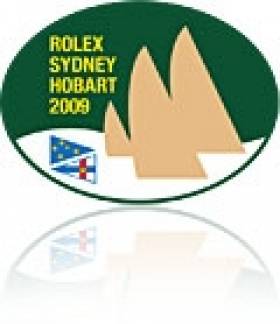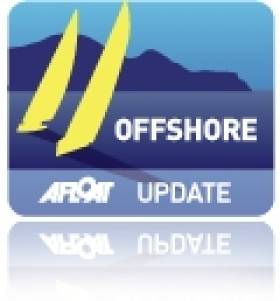Displaying items by tag: Hurley
Irish 'Breakthrough' Crew Fall Back in Sydney–Hobart Race
#rshyr – A joint Dublin Bay/Sydney crew are battling in strong winds to recover their mid–race third overall position after losing 22 places and first in division over the past 24 hours of the 628–mile Sydney–Hobart race.
The drop in performance – an estimated 1.5 knots off the pace all day – has prompted some of Breakthrough's shore crew to speculate that a torn spinnaker might be to blame.
Alternatively the easterly course chosen by Breakthrough might have contributed to a slower wind angle but for now there is no onboard report to explain the speed dip.
North-east winds are gusting up to 35 knots on the race course. A number of yachts have suffered damage including the dismasting of the Volvo 70, Giacomo.
The Barry Hurley led Breakthrough crew, that includes Dublin Bay sailors Kenneth and Alexander Rumball and Catherine Halpin, have slipped from third overall yesterday to 25th this morning with 200–miles left to the Hobart finish. The on–the–water race leaders have already finished in Hobart, Wild Oats XI took a record eighth win.
Just 24 hours earlier, as Breakhrough lay 33 miles off Gabo Island, the Irish crew were vying for the overall lead in the 70th edition of the race.
The slippage started last night around 11pm Irish time when the official standings revealed a drop to seventh overall. Hurley's crew maintained their class three lead despite being 1.5 knots off the pace but this morning – some ten hours later – the Beneteau First 40 crew has tumbled to 25th and is now tenth overall in a highly competitive 21–boat class three.
More on the race site here
Hurley & Boyle Lead Middle Sea Double Handers But Time is Running Out
#middelsearace – Dun Laoghaire's Dinah crewed by Barry Hurley and Andrew Boyle is leading the Two Handed Class after time correction but there estimated finish time is 1000 tomorrow; two hours after the time limit expires for this year's marathon Rolex Middle Sea Race.
The cut off time to is 0800 tomorrow and a group of determined sailors are desperately trying to keep that appointment.
Racing the Middle Sea Race Two-Handed is not for the faint hearted.
In reality each member of the team sails the boat alone, whilst the other one sleeps. But there is no rigid watch system, sail changes in this race have been frequent and both crew are required on deck, regardless of whose turn it is to sleep. In short, racing for seven days and nights with just two people is hard-core both mentally and physically.
The vast majority of the 83 yachts have either finished or will do today. However, none of the Two Handed teams is likely to finish tonight. To complete the Rolex Middle Sea Race, yachts must cross the finish line by 0800 tomorrow and four of the Two Handed entries are desperately trying to meet that deadline.
Dinah should speed up after they come off the wind after Lampedusa. If they can make the cut off, the Irish team may win a tremendous victory. Dinah is being pushed hard by Pierpaolo Ballerini & Andrea Caracci's Azuree, The Italian team is neck and neck with Dinah on the water but behind after time correction but the match race will be spurring both of the yachts on.
Leading the Two Handed Class on the water is Matchpoint, crewed by Damir Cargo and Miljenko Nikolic. The Croatian team. Matchpoint has passed Lampedusa and should make the finish in the early hours of Saturday morning, then they must wait to see if any of the other yachts can make it in time.
Second on the water is Atame with Beppe Bisotto & Ian Knight. Atame is 122 miles from the finish and at their current speed will not make the time limit. However, once Atame rounds Lampedusa, they will ease sheets and come off the wind dramatically increasing their boat speed, Atame need to average 7 knots to make the finish, which is possible.
The dark horse in the Two Handed Class is also the largest yacht. Swan 46, Foreign Affair has sailed a significant extra distance to get over to the left hand side of the race course 'banging the corner' in sailing slang. The elegant Swan is crewed by two brothers; Paul & James Basson from Monaco.
Over one thousand sailors have taken part in the Rolex Middle Sea Race and the event has attracted a worldwide audience, hopefully all of the race fans will be willing the determined sailors still racing to make the cut off time by 0800 tomorrow morning.

























































